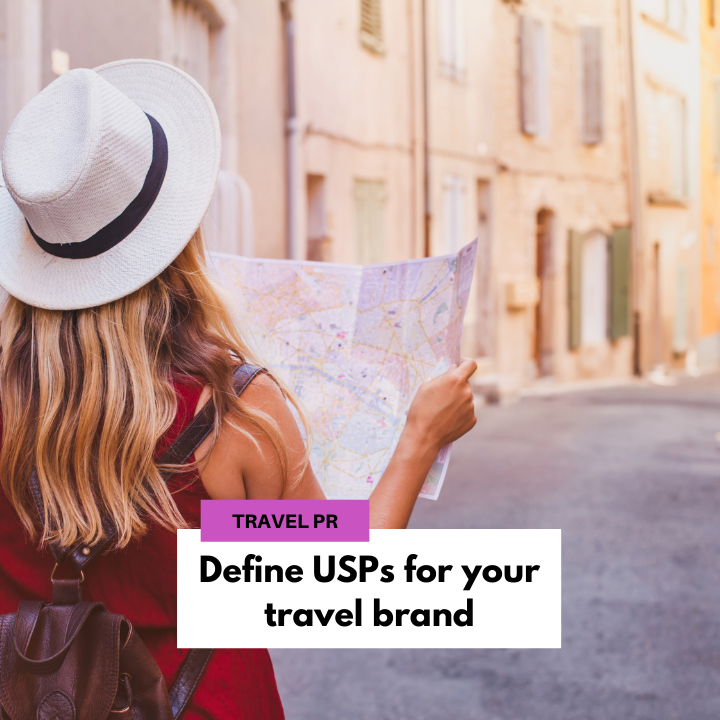Marketing shouldn’t be about simply making people buy from you, you need to identify what makes your travel brand stand head and shoulders above the competition and then showcase this value to your customers in everything you do.
If someone were to ask you what your travel company does that makes it different to everyone else, or why they should buy through you, would you be able to answer them straight away? The answer to these questions are your USPs.
What is a USP?
But first, what is a USP? It stands for Unique Selling Point (or sometimes ‘Proposition’) and is something that makes your brand remarkable. Every business needs one defined, unique quality to connect with their customers and this is your USP. You need to identify what it is that makes your travel brand different, what makes you special and then let it shine.
What could my USP be?
It could be the tailored service you offer, quality, location, or the invaluable knowledge and expertise you provide. This is what makes you stand out from the competition and is the heart and soul of your business. Be careful, your USP is not a list of the amenities or services you offer.
Developing a truly great USP starts with a clear understanding of who your target audience are and what they need. Once you understand this you can develop your offer and bring it to life to meet their needs perfectly. For example, Saga Holidays are very clear that their audience is the over 50s looking for cruises and tours in the UK and worldwide. If they started specialising in budget hotels in the heart of the world’s cities, they would certainly not be meeting their audience’s needs.
Make sure you are not trying to be all things to all people. Your USP and the things that make you special are the same things that will put some people off. Using the example of Saga Holidays again, by niching to the over 50s, they will not be getting many enquiries from 18-year olds looking to organise a gap year. This is fine, you aren’t right for everyone. Focus on making your business the only possible choice for your targeted dream clients.
Where do I start in defining my USP?
Defining your USP can take a bit of creativity and soul searching. Take some time to think about how each area of your business makes you unique – your brand, your team, your values, your industry and country knowledge, and your areas of expertise. This is a great stage to involve your team as they can provide invaluable insight. It also shows them how much you value their opinion.
Understand your customer. What do they value and why do they choose you over a competitor? Your customers must be at the heart of your USPs. It should not just be something about you as a brand, it should highlight how you benefit your clients. Travel especially is not about the product available but the experience it provides. For example, you may sell luxury holidays to the Caribbean, but what you are really selling is a moment of escapism from a busy working life; precious time with friends or family and memories to last a lifetime.
Be specific. Leave customers in no doubt how they will benefit if they buy through you. Don’t be afraid to narrow your focus, this makes it a lot easier to demonstrate your specialism rather than trying to be all things to all people as we touched on earlier.
Here are some questions to consider when defining your USP:
- Who is my ideal client? This is a complicated question, so would also need to be broken down by:
- Are they families, couples, students etc?
- How old are they?
- What kind of lifestyle do they lead? Are they cash rich but time poor? Are they young professionals or retired?
- What is their budget? Luxury? Mid-range? Budget?
- How do they like to travel? Small groups, large tours, privately etc?
- What kind of experience are they looking for? Adventure travel, cultural experiences, sustainable travel, fly and flop?
You may find that you have a few ideal customer profiles. This is fine as long as they link together somehow (i.e. age or travel experience).
- Why do customers choose to book through me? What do I offer that is different to competitors?
- What are my businesses’ strengths? Concentrate on these to help define your USPs
- What are my businesses’ weaknesses? What do you need to do to turn these weaknesses in to strengths?
- Which times of the year does my business perform best?
- What percentage of my customers are repeat business?
- Which is my best performing product/service?
You will notice that one thing we haven’t talked about when defining your USP is price. This should never be a strategy for a USP as it usually results in very tight margins, an unsustainable business and ultimately bad service. You need to make what you do so brilliant that you are the only logical choice for your ideal client regardless of price.
Once you are clear on who your ideal client is and what your unique offer is, you can summarise this into your value proposition, so the next time someone asks what your travel company does that makes you different to everyone else, you can answer them instantly.
Now that you are confident with your USP, take a look at our guide on brand storytelling to really bring your USP to life.
“People will forget what you said, people will forget what you did but people will never forget how you made them feel” – Maya Angelou
As PR experts, we want to give you all the tools you need to find the best PR agency for your business needs. If you need PR support but aren’t sure where to start, download our PR Buyer’s Guide to identify what to look for and expect! We want you to make the right choice for your business’ success!
If you feel like you need some further help in defining your USPs or telling your brand story, please get in touch with us here.
Hopefully these tips have been useful for your travel brand. If you’re looking for more ideas to promote your business, take a look at our blog on the ultimate guide to travel PR.






